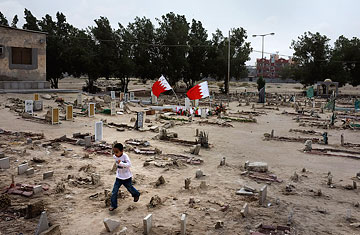
The fallen Flags mark the grave of 16-year-old Ali Yousif al-Satrawi, who was run over by a police car while taking part in a protest in the Manama suburb of Juffair last November
(2 of 2)
When Bahrain's Crown Prince Salman bin Hamad al-Khalifa called for dialogue and defended the rights of all Bahrainis to protest peacefully, Hubail and his Shi'ite teammates joined an athletes' rally denouncing the severity of the crackdown. Like a doctors' rally and a teachers' rally held on previous days, citizens gathered in the tens of thousands. The royal family is revered in Bahrain, and few of the protesters actually desire an end to the monarchy. But after the crackdown, emotions ran high, and several protesters called for the fall of the regime. Others, like Hubail, just asked for reform. Despite the promises, the crackdown became more severe, and on March 14, Saudi tanks rolled across the causeway to help Bahrain stifle the protest. Some 3,000 people were detained for participating, 2,000 suspended from government jobs and hundreds put on military trial, among them 64 athletes. They were sentenced to one to 15 years in prison. Hubail and his teammates, national heroes, were singled out in a rabid name-and-shame campaign conducted by a local sports channel. Government spokesman Abdul-Aziz bin Mubarak al-Khalifa says the broadcast, along with similar Facebook-based smear campaigns, was "regrettable" but denies that the government had anything to do with it. Hubail isn't placated. "I gave everything to my country, and this is what I get in return," he says. "All I did was go to a rally. Even His Majesty said it was permissible."
Hubail's travails were not over with the broadcast. The next day he and his teammates were pulled from practice and bundled into waiting vans. At the detention center, they were beaten until they signed false confessions. The torture lasted for two months. It wasn't just the athletes. Doctors, nurses, lawyers and journalists associated with the protests were similarly treated. "They came after all of us because we were the Shi'ite elite," says Bassim Dhaif, Bahrain's pre-eminent sports-medicine surgeon. Dhaif was tortured into informing against his colleagues in a tape later released on national TV. International outcry — including from the U.S. — resulted in the release of all but a few protesters in June, though hundreds are still awaiting a retrial in civilian courts.
Until then, Dhaif has been suspended from his job at Salmaniya Medical Complex, the country's only public hospital. Also suspended were the hospital's best heart surgeon, the only transplant surgeon, the top tier of theater nurses and the most experienced internists. All told, 178 experienced medical professionals are no longer working at Salmaniya.
Government officials admit that the crackdown may have been too harsh, but they defend their decision to quash a revolution that they claim took Bahrain into dangerous waters. "We are in the Gulf, not Scandinavia," says spokesman Khalifa. And then he hints darkly at an Iranian agenda to set up an "ideological Islamic state" in Bahrain, wielding a threat that resonates well with outsiders who have watched with alarm the success of Islamist parties in Egypt and Tunisia.
Protest leaders dismiss such claims as fearmongering propaganda, pointing out that not only the CIA but also a recent Bahraini-government-funded independent investigation into the uprising found absolutely no evidence of Iranian influence. The government responded with an indignant rebuttal: "Due to security and confidentiality considerations ... the Government of Bahrain did not share information of Iranian involvement."
That report was commissioned by King Hamad bin Isa al-Khalifa in June, in an attempt to bring healing to a traumatized nation. Despite findings of "systematic torture," "unlawful detention" and "excessive use of force," the report, which was released in late November, has helped refurbish the country's reputation. The King has been hailed for his unflinching transparency in a region where monarchs usually operate with impunity, and his government has been applauded for newly implemented reforms to policing and detention policies. Investment has started to trickle back in, and Formula 1 says Bahrain is back on the 2012 calendar, for now. Even $53 million in arms sales held up in the U.S. Congress pending the report's release looks like it will go through. On the surface, it seems that the government has successfully contained the revolution, just as it has quarantined the most restless of the Shi'ite villages. Still, the crackdowns continue. "The government's goal is to quash the revolution by any means necessary, while putting on a reformist window dressing," says Physicians for Human Rights deputy director Richard Sollom, who was denied entry to Bahrain on Jan. 9, despite having a visa. "And it's working."
But the protesters, along with the opposition Wefaq party, say the revolution lives on. Bahrain's newfound calm is relative: not a night goes by without reports of a tear-gas and rubber-bullet attack on protesters in Shi'ite villages, pro-democracy demonstrations or even funerals.
Back in Oman, Hubail just wants to go home and play for his country. After strong lobbying by international human-rights groups, the government has offered amnesty to protesters as long as they were not directly involved in fomenting unrest. But Hubail is wary. Other teammates are still awaiting trial. Soccer is about trust and communication, and Hubail fears that the damage may be irreparable. "After all the insults and the beatings, I'm not sure I can trust my country anymore."
